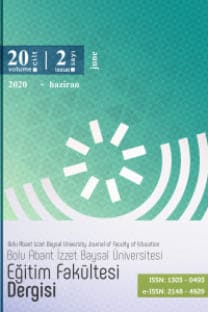İNGİLİZCE ÖĞRETİM GÖREVLİLERİNİN PANDEMİ DÖNEMİ UZAKTAN EĞİTİM SÜRECİ: BİR VAKA ÇALIŞMASI
Afet durumu eğitimi, uzaktan eğitim, pandemi dönemi dil eğitimi, eğitim teknolojilerine uyum
HOW ENGLISH LANGUAGE INSTRUCTORS COPED WITH THE ONSET OF THE PANDEMIC AND REMOTE LANGUAGE TEACHING: A CASE STUDY
Emergency remote teaching, distance education, pandemic period language education, adaptation to educational technology,
___
- Aksal, F. A. (2011). Action plan on communication practices: Roles of tutors at EMU Distance Education Institute to overcome social barriers in constructing knowledge. The Turkish Online Journal of Educational Technology, 8(2), 33–47.
- Akyıldız, S. T. (2020). Pandemi döneminde yapılan uzaktan eğitim çalışmalarıyla ilgili İngilizce öğretmenlerinin görüşleri (bir odak grup tartışması). Rumelide Dil ve Edebiyat Araştırmaları Dergisi, 21, 679-696. https://doi.org/10.29000/rumelide.835811
- Allen, E., Seaman, J., Lederman, D., & Jaschik, S. (2012). Conflicted: Faculty and online education, 2012. The Sloan Consortium. http://www.insidehighered.com/sites/default/server_files/survey/conflicted.html
- Barış, M. F. & Çankaya, P. (2016). Akademik personelin uzaktan eğitim hakkindaki görüşleri. International Journal of Human Sciences, 13(1), 399-413. https://doi.org/10.14687/ijhs.v13i1.3378
- Barr, B. A., & Miller, S. F. (2013). Higher education: The online teaching and learning experience. Online Teaching and Learning. http://files.eric.ed.gov/Fulltext/ED543912.pdf
- Baloran, E. T. (2020). Knowledge, attitudes, anxiety, and coping strategies of students during covid-19 pandemic. Journal of Loss and Trauma, 25(8), 635-642. https://doi.org/10.1080/15325024.2020.1769300
- Bond, C. S., Fevyer, D., & Pitt, C. (2004). Student reactions to online tools for learning to use the internet as a study tool: Outside the comfort zone? In R. Atkinson, C. McBeath, D. Jonas-Dwyer & R. Phillips (Eds), Beyond the comfort zone: Proceedings of the 21st ASCILITE Conference. Perth.
- Community College Research Center. (2013). Creating an effective online environment. Teachers College, Columbia University. http://ccrc.tc.columbiaEdu/media/k2/attachments/creating-effective-online-environment.pdf
- Creswell, J. W. (2012). Educational research. Pearson.
- Driscoll, A., Jicha, K. A., Hunt, N. A., Tichavsky, L., & Thomson, G. (2010). Can online courses deliver in-class results? A comparison of student performance and satisfaction in an online versus a face-to-face introductory sociology course. Teaching Sociology, 40(4), 312-33. https://doi.org/10.1177/0092055X12446624
- Hartshorn, K. J., & McMurry, B. L. (2020). The effects of the Covid-19 pandemic on ESL learners and TESOL practitioners in the United States. International Journal of TESOL Studies, 2(2), 140-156. https://doi.org/10.46451/ijts.2020.09.11
- Hodges, C. B., Moore, S., Lockee, B. B., Trust, T., & Bond, M. A. (2020, March 27). The difference between emergency remote teaching and online learning. https://er.educause.edu/articles/2020/3/the-difference-between-emergency-remote-teaching-and-online-learning
- Khanlarian, C., & Singh, R. (2013). An exploratory study of the online learning environment. Issues in Accounting Education. 29(1), 117-147. https://doi.org/10.2308/iace-50614
- Ko, S., & Rossen, S. (2010). Teaching online: A practical guide (3rd ed.). Routledge.
- MacIntyre, P. D., Gregersen, T., & Mercer, S. (2020). Language teachers’ coping strategies during the Covid-19 conversion to online teaching: Correlations with stress, wellbeing and negative emotions. System, 94, 102352. https://doi.org/10.1016/j.system.2020.102352
- Means, B., Bakia, M., & Murphy, R. (2014). Learning online what research tells us about whether, when and how. Routledge Taylor & Francis Group.
- Mulig, L., & Rhame, S. (2012). Time requirements in an online teaching environment: How to be more effective and efficient in teaching online. Journal of Accounting and Finance, 12(4), 101-109.
- Nash, J. A. (2015). Future of online education in crisis: A call to action. The Turkish Online Journal of Educational Technology, 14(2), 80-88.
- Pu, H. (2020). Implementing online ELT in the time of crisis: Ordeal or opportunity? ELT Journal, 1(4), 345-348.
- Schleicher, A. (2020). Education disrupted—education built. Spotlight: Quality education for all during Covid-19 crisis. OECD/Hundred Research Report #011. https://hundred-cdn.s3.amazonaws.com/uploads/report/file/15/hundred_spotlight_covid-19_digital.pdf
- Şevik, M., & Yücedağ, Z. (2021). An evaluation of distance education during the Coronavirus-19 pandemic: The views of Turkish EFL teachers. Eğitim Bilimleri Enstitüsü Dergisi, 9(11), 171-190.
- Thiede, R. (2012). Best practices with online courses. US-China Education Review, A2, 135-141. https://eric.ed.gov/?id=ED532176
- Wang, C., Pan, R., Wan, X., Tan, Y., Xu, L., Ho, C. S., & Ho, R. C. (2020). Immediate psychological responses and associated factors during the initial stage of the 2019 coronavirus disease (COVID-19) epidemic among the general population in China. International Journal of Environmental Research and Public Health, 17(5), 17-29.
- Wilkes, R. B., Simon, J. C., & Brooks, L. D. (2006). A comparison of faculty and undergraduate, student perceptions of online courses and degree programs. Journal of Information Systems Education, 17(2), 131-140.
- UNESCO (2011). Understanding education’s role in fragility: Synthesis of four situational analyses of education and fragility: Afghanistan, Bosnia and Herzegovina, Cambodia, Liberia. https://unesdoc.unesco.org/ark:/48223/pf0000191504
- ISSN: 1303-0493
- Yayın Aralığı: 4
- Başlangıç: 2000
- Yayıncı: Abant İzzet Baysal Üniversitesi Eğitim Fakültesi
İKİ BOYUTLU BENLİK SAYGISI: DİĞER BENLİKLERLE İLİŞKİSİ
Necla ACUN KAPIKIRAN, N.ceren GÜZEL
ÖĞRETİM DİLİ OLARAK İNGİLİZCE: ÖĞRETİM ELEMANLARININ GÖRÜŞLERİ
SALGIN SÜRECİNİN SOSYAL BİLGİLER ÖĞRETMEN ADAYLARININ MESLEKİ YETERLİLİKLERİ ÜZERİNDEKİ ETKİLERİ
Gültekin TINAZTEPE, Serap KEMALİ, Sinem SEZER EVCAN
ÖĞRETMEN ADAYLARININ BİLİMSEL BİLGİNİN DOĞASI HAKKINDAKİ GÖRÜŞLERİNİN İNCELENMESİ
